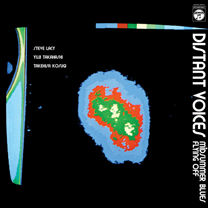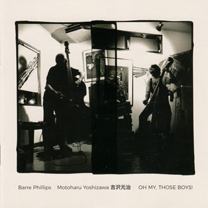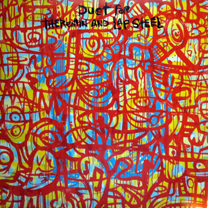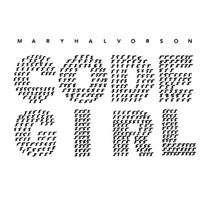|
|
|
|
Music Reviews from the Staff of the Poison Pie Publishing House
|
|
May 13, 2018
New Vinyl in Early 2018
Good music, new and old, continues to find its way to the staff of the Poison Pie Publishing House. Some of it we are able to appreciate. Here we briefly review five new albums that appeared in vinyl in 2018. By coincidence, the first three records feature collaborative music among men, one of whom, in each case, is now dead and from whom the only "new" music to be heard is that which has sat on tapes or out-of-print vinyl, waiting patiently to be introduced to new ears.
|
|
|
Distant Voices - Steve Lacy, Yuji Takahashi, Takehisa Kosugi
 Label: Aguirre Records
Label: Aguirre Records
Catalog #: ZORN51
Country: Belgium
Release Date: May, 2018
Media: lp
discogs.com entry
Originally released in 1976 by Nippon Columbia Co., Ltd.
Steve Lacy went to Japan in June of 1975 and recorded several albums at Nippon Columbia 1st Studio, Tokyo with Japanese artists of a free jazz bent. Amazingly, some of these recordings, such as The Wire, Stalks and Distant Voices have never been reissued in any format since their initial release in Japan. The reissue of Distant Voices is thus an opportunity to bring this music to at least two generations of new ears. Forty-two years have elapsed since its original release, but there is no mid-seventies feel to the album. The other-worldly music is not dated to any period of time. It is sometimes melodious and sometimes dissonant, sometimes dense and sometimes sparse, sometimes purposefully musical and at other times meanderingly experimental. Lacy (July 23, 1934-June 4 2004) is at home on the soprano sax, Takahashi (September 21, 1938-) is on piano and Kosugi (March 14, 1938-) plays violin, although each take turns tinkering with other instruments as well. It seems to defy belief that this music has remained inaccessible to many for so long. Who knows what mechanisms the folks at Aguirre Records had to invoke in order to bring this reissue into being. Let's hope that they can reproduce their magic with some of the other lost gems.
|
|
|
Oh My, Those Boys! - Barre Phillips & Motoharu Yoshizawa
 Label: No Business Records
Label: No Business Records
Catalog #: NBLP 111
Country: Lithuania
Release Date: January, 2018
Media: lp
discogs.com entry
Recorded live on the 5th April 1994 at Café Amores, Hofu, Yamaguchi, Japan.
Another part of this concert was previously released in 1998 on Live "Okidoki".
This is a bass duet featuring Barre Phillips (October 27, 1934-) and Motoharu Yoshizawa (1931-September 12, 1998) from a concert in 1994. Yoshizawa plays his home-made, electric, upright five-string bass. Although the recording has waited twenty-four years to be released, the men were in their sixties (or nearly so) by the time the concert was played. They had long ago established themselves as consummate masters of their instrument. It is a delight that this dialogue has been preserved for contemporary ears.
According to the timing information provided on discogs.com, it appears that the cd version of this reissue contains about half an hour of additional material, compared to the vinyl. So, you can't go wrong either way.
|
|
|
Duo - Derek Bailey & Tristan Honsinger
 Label: Honest Jon's Records
Label: Honest Jon's Records
Catalog #: HJRLP204
Country: United Kingdom
Release Date: 2018
Media: lp
discogs.com entry
Recorded February 6 & 7, 1976 in England
Originally released on lp as INCUS 20 on Incus Records in 1976.
This lp, a duet between the guitarist, Derek Bailey (January 29, 1930-December 25, 2005) & the cellist, Tristan Honsinger (October 23, 1949-), is part of the second wave of recent vinyl reissues by Honest Jon's Records of Bailey recordings originally released in the 1970's on Incus Records. The staff of the Poison Pie Publishing House reviewed the first wave of three double-vinyl releases in December, 2017. The two records in this second wave are both single vinyl reissues and include the Bailey solo record, Lot 74 as well. Unlike Lot 74, which had a reissue on compact disc in 2009, Duo by Bailey and Honsinger has been available only on the original lp. The folks at Honest Jon's Records have ably remedied this distressing situation with meticulous care for the subject, including remastering.
These reissues can be enjoyed by a variety of folks. For younger people, unfamiliar with the music of Derek Bailey, they provide an accessible entry point into a seminal period of his playing. These works serve as a clear and brilliant illustration of non-idiomatic improvisation of the late twentieth century. For fans who know of the music of Bailey but who haven't plumbed the depths of his extensive discography, these reissues provide an opportunity to hear music that was until now rare. Finally, for aficionados of the free improvisation scene of the 1970's, they provide an invitation to listen again to records that have captured the spirit of an age of music, whose accomplishments and principles implicitly guide experimental musicians of today.
|
|
|
10 - Duet For Theremin And Lap Steel
 Label: not on label; self-released
Label: not on label; self-released
Catalog #: none
Country: United States
Release Date: 2018
Media: lp
discogs.com entry
This lp contains a selection of material from the compact disc of the same name, which actually does contain '10' tracks, released in 2016.
The staff of the Poison Pie Publishing House recognizes that there is value in actively pursuing the music of contemporary experimentalists. While the reissues of musicians now dead have an appeal, the evolution of the making of music is, of course, a living, breathing, dynamic phenomenon. If one exclusively listens to music of the dead, one might as well just listen to Beethoven and Mozart. With this philosophy in mind, we try to (occasionally) broaden our horizons, often with great success, as in this instance. We didn't know much about this duo but they were invited to the Big Ears Festival (March, 2018) in the hometown of the Poison Pie Publishing House, Knoxville Tennessee. In fact we purchased this lp at the festival merchandise table (but it is also available on bandcamp). We had never heard a theremin and lap steel duet and, to our knowledge, this duet featuring, Frank Schultz and Scott Burland, is the only one in existence. This album is everything one could have hoped for. The unusual instrumentation already marks it as a musical experiment. There certainly are tracks to appeal to the adventurous ear. At the same time, there are lovely melodies on the album that will appeal to ears of any kind. It is a delight and a reminder why it is such a pleasure to maintain an active exploration of new musical voices.
|
|
|
Code Girl - Mary Halvorson
 Label: Firehouse 12 Records
Label: Firehouse 12 Records
Catalog #: FH12-04-08-027
Country: United States
Release Date: March 30, 2018
Media: lpx2
discogs.com entry
Today, Halvorson is a leading voice in freely improvised music. The Mary Halvorson ensembles (insert trio, quartet, quintet, septet or octet) exquisitely present her musical vision in ways that are very hard for fans of experimental, improvised music to resist. Her other collaborative recordings vary terrifically in style and demonstrate her range and her adventuresome spirit. We at the Poison Pie Publishing House count ourselves among the converted.
On Code Girl, Mary Halvorson has written songs for an ensemble that includes herself on guitar, Michael Formanek (bass), Tomas Fujiwara (drums) and Ambrose Akinmusire (trumpet). The featured member of the ensemble is the vocalist, Amirtha Kidambi, who sings lyrics written by Halvorson. There are numerous reviews written by listeners associated with prominent musical magazine extolling the virtues of this new direction for Halvorson. We recommend the relevant google search to the interested reader. Our own reaction was more tepid.
We discovered that we, for the moment, lack the attenuation to appreciate this particular record. Of course, such a reaction has its own significance and places Halvorson in the company of historical, musical greats as Ornette Coleman. Coleman worked in a rich variety of modes over the course of his lifetime; very few listeners could claim to enjoy them all. Some might find Coleman's The Shape of Jazz to Come revolutionary and yet be unable to appreciate the fusion of Prime Time. No one could legitimately argue that both records (and all of those in between) weren't genuine expressions of Coleman's harmolodics. Rather, it was a predisposition of the listener's ear that opened it to one record and not another. In fact, it was Coleman who convinced us that not liking everything in a particular musician's discography was an essential component of an experimentalist. So too is it the case with Code Girl. While we applaud Halvorson for her experimentalist nature, we found this record unrewarding. During our listenings, we repeatedly asked ourselves, "Who was this record made for?" because it seemed, obviously, not to be us.
|
|
|
More music reviews from the Poison Pie Publishing House
|
|
|
|

